MCP-Flow Enables LLM Agents to Master Complex Tool Use
New research introduces MCP-Flow, a framework enabling LLM agents to effectively use Model Context Protocol tools across diverse real-world tasks with improved accuracy and scalability.

A new research paper introduces MCP-Flow, a comprehensive framework designed to enable large language model (LLM) agents to effectively utilize Model Context Protocol (MCP) tools in diverse, real-world scenarios. The work addresses critical challenges in agent-based systems where LLMs must navigate complex toolsets and execute multi-step tasks with precision.
The Tool Use Challenge for AI Agents
As LLM-powered agents become more sophisticated, their ability to interact with external tools and APIs becomes crucial. However, existing approaches often struggle with three key limitations: handling diverse tool types across different domains, scaling to large tool repositories, and maintaining performance in real-world deployment scenarios.
The Model Context Protocol (MCP) has emerged as a standardized interface for connecting LLMs to various data sources and tools. Yet simply providing access to MCP-compatible tools doesn't guarantee agents will use them effectively. This gap between tool availability and competent tool use is what MCP-Flow aims to bridge.
Technical Architecture and Methodology
MCP-Flow introduces a multi-stage framework that combines instruction fine-tuning, retrieval mechanisms, and execution monitoring. The system employs a hierarchical approach where agents first analyze task requirements, identify relevant tools from the MCP ecosystem, and then execute sequences of tool calls to accomplish objectives.
The framework incorporates several technical innovations. First, it implements a tool-aware retrieval system that semantically matches task descriptions with appropriate MCP tools, even when dealing with hundreds of available options. Second, it uses execution feedback loops that allow agents to course-correct when tool invocations produce unexpected results.
The researchers developed specialized training data that exposes LLMs to diverse MCP tool usage patterns. This training corpus includes examples of successful multi-tool workflows, error recovery scenarios, and edge cases that agents might encounter in production environments.
Benchmark Results and Performance Gains
The paper presents extensive evaluation across multiple benchmarks testing tool use capabilities. MCP-Flow demonstrates significant improvements over baseline approaches in both task completion rates and execution efficiency. The framework shows particular strength in scenarios requiring coordination of multiple tools and in handling previously unseen tool combinations.
Performance metrics reveal that agents equipped with MCP-Flow successfully complete complex, multi-step tasks that would typically require human intervention. The system maintains accuracy even as the number of available tools scales into the hundreds, addressing a critical scalability concern for production deployments.
Real-World Application Implications
The practical applications of MCP-Flow extend across numerous domains. In content creation workflows, agents could coordinate multiple tools for video processing, audio synthesis, and metadata management—directly relevant to synthetic media production pipelines. The framework's ability to handle diverse tool types makes it applicable to scenarios requiring integration of generation, editing, and verification tools.
For digital authenticity applications, MCP-Flow could enable agents to orchestrate multiple detection and analysis tools, cross-referencing results from different verification systems to provide more robust authenticity assessments. The framework's structured approach to tool orchestration could improve the reliability of automated content verification systems.
Technical Contributions and Future Directions
Beyond immediate performance improvements, MCP-Flow contributes methodological advances to the field of agent-based AI systems. The research demonstrates how standardized protocols like MCP can be leveraged to create more capable and reliable agents, while also identifying remaining challenges in tool use generalization.
The work highlights the importance of structured frameworks for agent development, particularly as the complexity and diversity of available AI tools continues to grow. As video generation, voice cloning, and other synthetic media technologies proliferate, frameworks like MCP-Flow become essential for managing the integration and deployment of these capabilities at scale.
This research represents an important step toward more autonomous and capable AI agents that can effectively leverage growing ecosystems of specialized tools. For practitioners working with AI video generation, deepfake detection, or digital authenticity verification, the principles demonstrated by MCP-Flow offer insights into building more robust multi-tool workflows and agent-based systems.
Stay informed on AI video and digital authenticity. Follow Skrew AI News.



